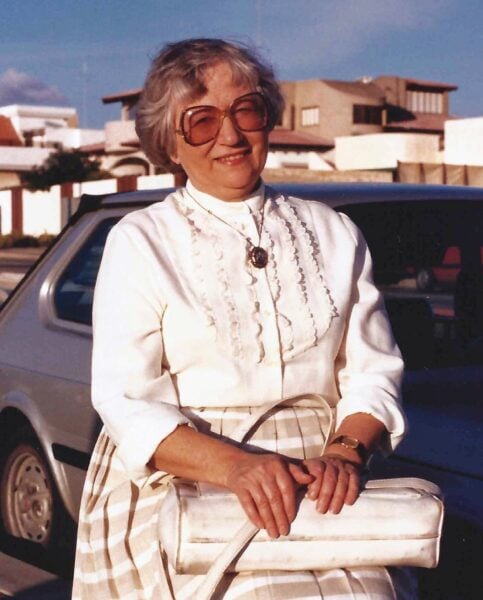
Hedva Ben-Israel. Photo courtesy Oren Kidron
Hedva Ben-Israel, professor at the Hebrew University of Jerusalem (HUJ) and one of the foremost scholars of modern nationalism, died on May 12, 2023, after a long illness she had faced with grace and courage. A prolific scholar and lecturer, and a generous teacher and mentor, her table, always laden with elegant and abundant fare, regularly witnessed warm and vibrant conversation among friends, colleagues, and visiting scholars. She was also the beloved mother of three sons, Oren, Dan, and Irad, and the proud grandmother of 10 adored grandchildren.
Born in Jerusalem in 1925 to a family of Zionist intellectuals, Hedva earned an MA under Richard Koebner at HUJ. She interrupted her studies to serve as a soldier in the British Auxiliary Territorial Service in 1945–46 and in the Haganah in 1947–48 during the siege of Jerusalem and in Haifa and eastern Galilee as a company commander. When she returned to civilian life, she taught history for a year at HUJ.
Hedva was then awarded a British Council scholarship to pursue a PhD at the University of Cambridge. Sir Herbert Butterfield advised her thesis, which was published as English Historians on the French Revolution (Cambridge Univ. Press, 1968). Hedva cherished these years in England, where she taught Hebrew for the Cambridge University Jewish Society, gave talks in Hebrew over the BBC, made numerous friends, and became an enthusiastic fan of old British films and television serials.
Upon her return to Israel, Hedva began a 37-year tenure at HUJ until her retirement in 1994. Beginning in 1976, she held the Ben-Eliezer Chair for the Study of National Movements, and between 1980 and 1984 she served as head of HUJ’s history department. She was also a visiting professor at Tel Aviv and Haifa Universities and abroad at Trinity College, Connecticut; the University of California, Los Angeles; and the University of Munich. In addition, she was granted fellowships at the National Humanities Center in North Carolina (1985–86); the Unit for the History of Ideas in Canberra, Australia (1989); and HUJ’s Institute for Advanced Studies (2004).
In 2000, Hedva joined the team writing and editing the history of HUJ. Her chapter on the Mandate period, documenting the institution’s numerous contributions to the Palestine economy, educational system, and medical sciences, acutely analyzed the variety of political opinions among its faculty, staff, and students and the role of its famous chancellor and later president Judah Magnes in the debates over binationalism versus a Jewish state.
For almost five decades, Hedva actively participated in the debates over modern nationalism, which had drawn in historians and social scientists seeking to understand its strength and resilience in the late 20th century. Moving beyond a Eurocentric perspective, in numerous lectures, essays, and articles she stressed the contingency and complexity of this phenomenon and its diverse religious, cultural, historical, economic, and political contexts from India to central Europe, and from Ireland to the Western Hemisphere. With her investigations of the origins of modern nationalism, Hedva affirmed the enduring heritage of ancient groups who, conscious of their separate identity, had resisted foreign control and carried the memory of their homeland into exile. Another signal contribution was her critique of the rigid distinction between civic and ethnic nationalism, insisting on their coexistence in all modern nation states. And as one of the few Israeli historians to place Zionism in a comparative context, Hedva noted the irony that although Theodor Herzl had drawn inspiration for his ideology from European models, aiming to transform the Jews into “a people like the other people,” contemporary critics have singled out Israel’s inhabitants for their nationalism.
To Hedva Ben-Israel, modern nationalism was a fluid, contingent, and enduring historical reality: a fusion of culture and power. In her most striking piece, “Nationalism: Animal, Vegetable, Mineral, or Cultural?” (Australian Journal of Politics and History, 1994), she noted its paradoxical nature: “With its feet of clay, stuck in ethnicity and territoriality, with its misguided notions about the natural division of humanity, with its by now obsolete ideal of the totally sovereign nation-state, [nationalism] still represents one of the many attempts by which . . . the human spirit has attempted to rise above itself . . . and recreate . . . a fraternal community.”
Carole Fink
Ohio State University (emerita)
This work is licensed under a Creative Commons Attribution-NonCommercial-NoDerivatives 4.0 International License. Attribution must provide author name, article title, Perspectives on History, date of publication, and a link to this page. This license applies only to the article, not to text or images used here by permission.